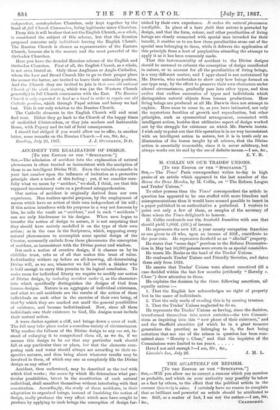ACCIDENT THE REALIZATION OF DESIGN.
[To THE EDITOR OF THE " SPECTATOR."]
SIR,—The admission of accident into the explanation of natural phenomena is often treated as inconsistent with the ascription of them to an intelligent Divine Will. Even the valuable remarks in your last number upon the influence of imitation as a protective principle show a touch of this feeling ; yet, if we consider care- fully what we mean by " accident," we shall, I think, see that this supposed inconsistency rests on a profound misapprehension.
Our notion of accident is originally derived from our own experience. Man realizes special purposes, by the employment of means which have an action of their own independent of his will ; if this action interferes with his purposes in a way not foreseen by him, he calls the result an " accident," and in such " accidents " can see only hindrances to his designs. When men began to transfer the notion of design to nature, it is not surprising that they should have naively modelled it on the type of their own action ; as in the case in the Scriptures, which, supposing every natural phenomenon to accomplish some special design of the Creator, necessarily exclude from these phenomena the conception of accident, as inconsistent with the Divine power and wisdom.
But such a notion of creative design, if it charms us by its childlike trust, robs us of all that makes this trust of value. Individuality withers up before an all-knowing, all-determining Divine will, as we see, whenever we fall in with a thinker who is bold enough to carry this premiss to its logical conclusion. To make room for individual liberty we require to modify our notion of Divine design, by including accident under it, as the character- istic which specifically distinguishes the designs of God from human designs. Nature is an . aggregate of individual existences, and what we call accidents are the results of the action of these individuals on each other in the exercise of their own being, of thatty which they are marked out amid the general possibilities of existence, and become individualized. Now, since all these individuals owe their existence to God, His designs must include their mutual action.
A wave dashes against a cliff, and brings down a mass of rock. The fall may take place under a countless variety of circumstances. Why confine the fullness of the Divine design to any one set, in- stead of enlarging it to comprehend them all, as we do, if we assume this design to be not that any particular rock should fall at any particular time or place, but that the elements com- posing rock and water should always act according to their re- spective natures, and thus bring about whatever results may be involved in them, of which any one as completely fills the Divine design as any other?
Accident, thus understood, may be described as the tool with which God works ; the means by which He determines what par- ticular possibilities, latent in the constitution of each natural individual, shall manifest themselves without interfering with that constitution. Accordingly, the study of these accidents, in their adaptation to organized beings, instead of banishing the notion of design, really produces the very effect which men have sought to produce by applying to such beings the conception of design fur- nished by their own experience. It makes the natural phenomena intelligible. In place of a bare faith that nature is pervaded by design, and that the form, colour, and other peculiarities of living beings are closely connected with special uses intended for their benefit, it enables us to see how these peculiarities arose out of the special uses belonging to them, while it delivers the application of this principle from a host of perplexities attending the attempt to apply it as it has been commonly made.
That this instrumentality of accident to the Divine designs should be assumed to exhaust the conception of design manifested in nature, or to account for all the peculiarities of living beings, is a very different matter, and r apprehend is not maintained by Mr. Darwin, who undertakes to show only how beings formed on one type may, by the effort to preserve their own chaiacters under altered circumstances, gradually pass into other types, and thus evolve that endless succession of types and individuals which distinguishes natural objects from human productions. How living beings are produced at all Mr. Darwin does not attempt to explain. Here seem to come in, as you have intimated, not only the mysterious faculties of growth and reproduction, but other principles, such as symmetrical arrangement, connected with intelligent action, besides that utilitarian aspect of deSign worked out by the struggle for existence on which Mr. Darwin insists.
I wish only to point out that this operation is in no way inconsistent with an intelligent action in nature, but it is in truth only an illustration of the lesson taught by all science, that the Divine action is essentially reasonable, since it is never arbitrary, but always works out its end by the use of definite means.—I am, &c., E. V. N.






























 Previous page
Previous page